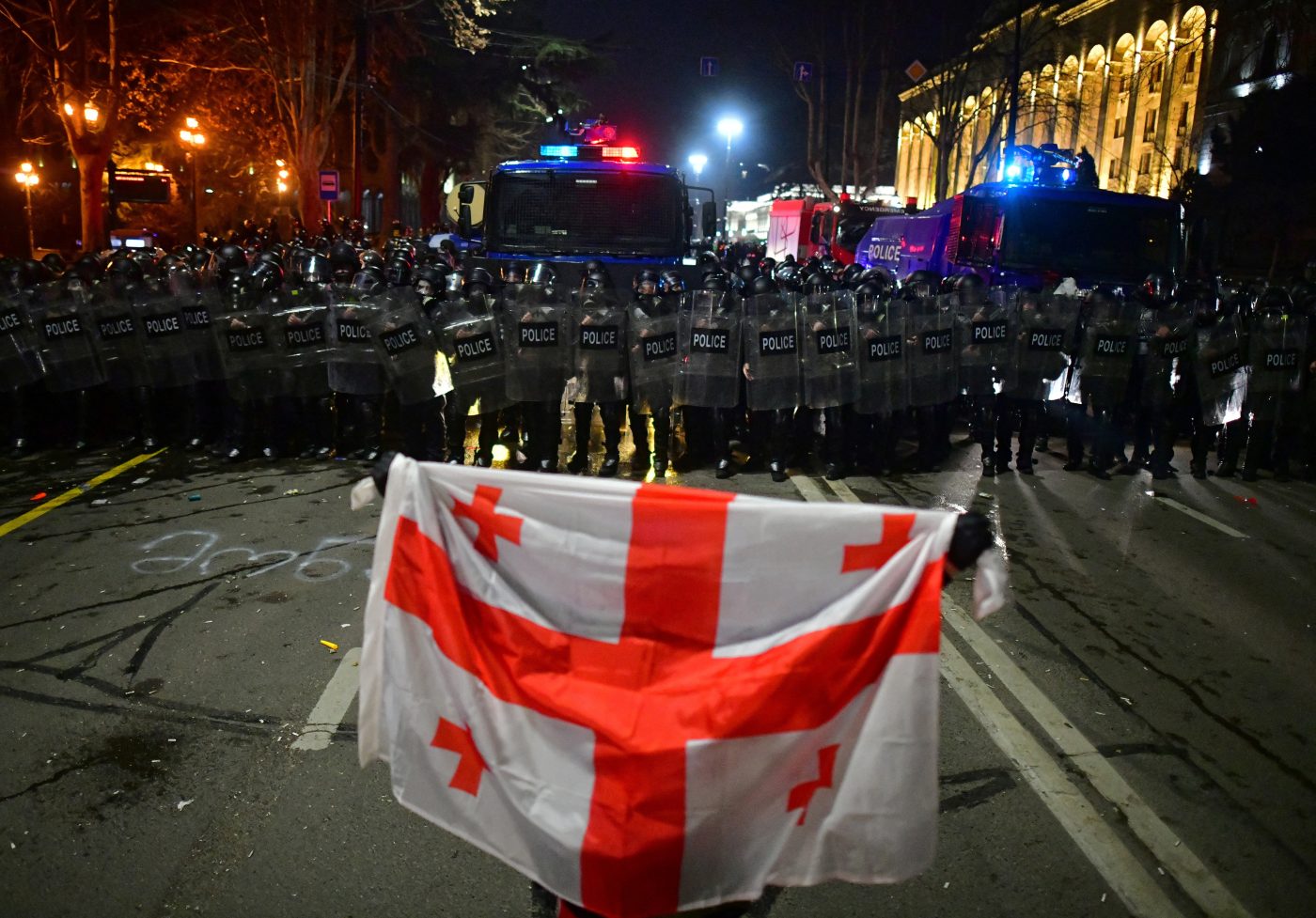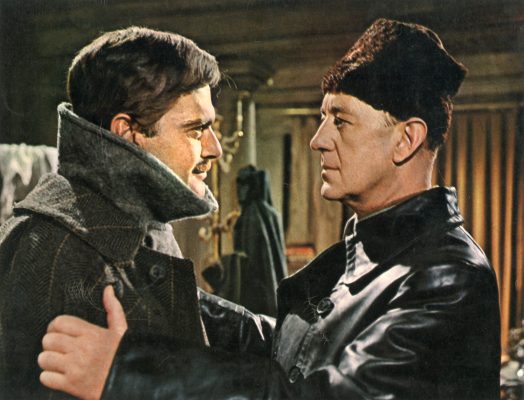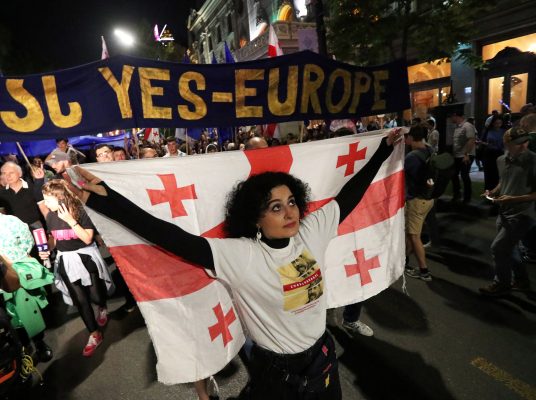Georgian Dream consistently paints itself as a champion of peace, contrasting it with the opposition, media, NGOs, and Western allies, whom it depicts as warmongers.
Whether addressing the unsuccessful impeachment of Georgian President Salome Zurabishvili, the refusal to impose sanctions against Russia or European Union (EU) demands for reform necessary for the EU candidate status, the core message is constant: the party safeguards peace, while the West advocates war with Russia.
There was a striking example of this approach after the 7 October Hamas terrorist attack on Israel when government propagandists said Georgians were fortunate not to witness the horrors of dead children and street explosions, underlining the party’s claim that others would lead Georgia into war.
When Western nations imposed sanctions on Russia, the ruling party justified its non-alignment by citing the risk of Russian aggression. In response to EU calls for reforms necessary for candidate status, the party claimed the bloc was pushing Georgia to open a second front against Moscow.
Even when the US sanctioned Georgian judges for corruption, the party maintained the US aim was to entangle Georgia in a conflict with Russia.
In September, the State Security Service of Georgia launched an investigation into an alleged coup d’état and claimed that USAID had financed revolutionary training sessions in a hotel meeting room. Such investigations, as FactCheck Georgia has shown, have been used repeatedly as pre-election stunts. No arrests were made, but the allegations were used in propaganda.
Ultra-right-wing groups affiliated with the party also recently launched the anti-Maidan movement (a reference to Ukraine’s anti-Russian uprising of 2014), pledging to resist those who engage in street protests against the government.
This author’s October 5 article about the importance of making future EU conditions for membership discussions more explicit and stricter (on, for example, an independent judiciary and an independent media) was used by government propagandists to claim that the whole of Georgian civil society opposed EU candidate status. Propaganda channels dedicated dozens of posts, articles, statements, and television shows to this absurd claim, shifting blame for the expected failure to receive candidate status yet again.
Ironically, Georgia might still get EU candidate status this year, though only three of the bloc’s 12 priorities have been assessed as fulfilled. The overwhelming majority of Georgian people (over 80%) support EU membership and this is well-known by European leaders.
Leaving Georgia two steps behind Ukraine and Moldova on the path to EU membership does not seem politically feasible to Georgia’s European friends, and many civil society organizations play along out of a patriotic desire to see Georgia advance towards the EU toward this goal.
This synergy of Georgians’ European identity, the ruling party’s geopolitical blackmail, EU strategic thinking, and Georgian civil society organizations’ Euro-patriotism might yet land Georgia the EU candidate status.
The sophistication of Georgian Dream’s propaganda efforts was highlighted in a recent report by the online news service Publika, which focused on how party leaders tailor their messages to different audiences.
Prime Minister Irakli Gharibashvili adopts a more conciliatory tone toward US and EU leaders, but often praises the party founder and oligarch Bidzina Ivanishvili; the party chairman Irakli Kobakhidze often takes an aggressive stance on the West, and Tbilisi mayor Kakha Kaladze frequently emphasizes the importance of peace.
The party consistently blames the opposition and civil society for attempting to drag Georgia into war and undermine the country’s European integration aspirations, using this claim to paper over its disconnection from European-minded Georgians and failure to deliver on the EU-requested reforms.
The party’s propaganda is amplified by the Imedi TV, Rustavi 2, and PosTV television and social media channels, as well as thousands of fake news websites and trolls employed by the party and their TV stations, to portray Georgian Dream’s favorable image. Since 2019, Meta (Facebook) has removed hundreds of pages affiliated with the Georgian government for their “coordinated inauthentic behavior.”
A central thrust of the propaganda is the portrayal of all NGOs as “wealthy” and foreign spies, a trick straight out of Russia’s playbook. Former US Ambassador Kelly Degnan has often been depicted as a puppet master orchestrating opposition parties and NGOs against the government.
Attacks on civil society organizations climaxed in March 2023 when Georgian Dream tried to pass a law on so-called foreign agents, which critics likened to the repressive Russian model. The party eventually backtracked due to a public backlash and street protests but was not deterred from its attacks on NGOs. Party leaders said the goal of portraying Georgian civil society as a hotbed of foreign spies had been achieved.
Liberalism has become a derogatory term under Georgian Dream’s rule, which consistently takes a tough stance on LGBT+ rights, framing it as “gay propaganda.” The party’s expulsion from the Party of European Socialists for embracing anti-liberal policies was explained by propagandists as retaliation for its defense of conservative family values from liberal encroachment.
As the 2024 parliamentary elections draw near, the West, including the new US Ambassador to Georgia and EU leaders, should be worried about the drastic rise of disinformation and anti-Western propaganda.
While Georgian Dream may enhance its electoral prospects through such tactics, it undermines societal resilience and cohesiveness through polarizing rhetoric and smear campaigns. Anti-Western propaganda also undermines Georgia’s European aspirations and creates fertile ground for Russian manipulation.
Polarization and the demonization of civil society and free media are seen as vital for the ruling party to maintain power in the elections, which will be fully proportional. Achieving around 40-45% of the votes, essential for maintaining one-party rule, would be a formidable challenge without it.
If Georgian Dream manages to win the 2024 ballot with its rampant anti-Western rhetoric, it will mark an unprecedented shift in Georgia’s political landscape as, for the first time, the country will have a government elected on an anti-Western platform.
Such an outcome would jeopardize not only the interests of the Georgian people but also the strategic interests of the US and the EU.
Dr. Sergi Kapanadze is a founder of a Georgia-based think tank – GRASS. He is a former deputy foreign minister, vice-speaker of the parliament, and a professor of international relations at the Ilia State and Caucasus Universities.
Europe’s Edge is CEPA’s online journal covering critical topics on the foreign policy docket across Europe and North America. All opinions are those of the author and do not necessarily represent the position or views of the institutions they represent or the Center for European Policy Analysis.





